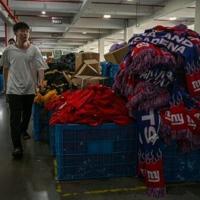Tariff fears are hurting World Cup merchandise orders at Shang Yabing’s Chinese knitwear factory, where racks of scarves bear the logos of national teams from Ireland to Tanzania.
Manufacturers in China’s export hub Yiwu would normally already be inundated with World Cup orders ahead of next summer’s football tournament, this time hosted by the United States, Mexico and Canada.
But a rollercoaster ride of a trade war between Washington and Beijing is making international buyers think twice before placing orders with companies like Shang’s Yiwu Wells Knitting Product.
When AFP visited his bustling workrooms, Shang was overseeing rows of colleagues adding the finishing touches to a plethora of sports-themed accessories.
“We’ve been in this industry for over 10 years, and we’ve produced World Cup-related merchandise for nearly every tournament in that time,” Shang said.
“This year, we’ve secured some smaller orders, but the larger ones that were on hold before haven’t materialised yet… this is likely because of the US tariffs,” he added.
At the factory on Thursday, crates overflowing with colourful wares surrounded employees’ workstations.
Some workers used sewing machines to attach fringe trims to the ends of scarves, while another ironed green and yellow lengths of fabric emblazoned with the word “Australian”.
China and the United States have extended a temporary truce, staving off triple-digit tariffs on each other’s goods until November, but the two sides continue to spar over semiconductors and TikTok.
With a little under nine months to go before the World Cup, Shang said the company was still waiting for clients to approve substantial orders amounting to around a million pieces.
– ‘Lack of clarity’ –
Along the fluorescent-lit hallways of Yiwu’s sprawling International Trade City, one of the world’s largest wholesale markets, stores offering soccer balls and flags were relatively quiet compared to the rush of foreign buyers the sales hub sees during peak periods.
Vendors displayed everything from flag-printed sunglasses to miniature football cleats hanging on keychains.
“By this point before the last World Cup, we saw a huge influx of orders,” Daisy Dai, a seller of printed soccer balls, told AFP.
This year, she said, “customers are holding back”.
American buyers previously made up a large part of Dai’s clientele but “since the start of the trade war a number of large brands stopped ordering, because of a lack of clarity on tariffs”.
Zhou Yanjuan, a seller of flags and World Cup-themed souvenirs, told AFP that shipments abroad had slowed for her.
“We’re not selling necessities after all,” Zhou said.
Still, she was optimistic that “things will gradually improve going forward”.
“Everyone’s probably waiting for (tariffs) to be adjusted downward,” Zhou said.
“That could make things a little easier for us.”
bur-tjx/reb/abs


